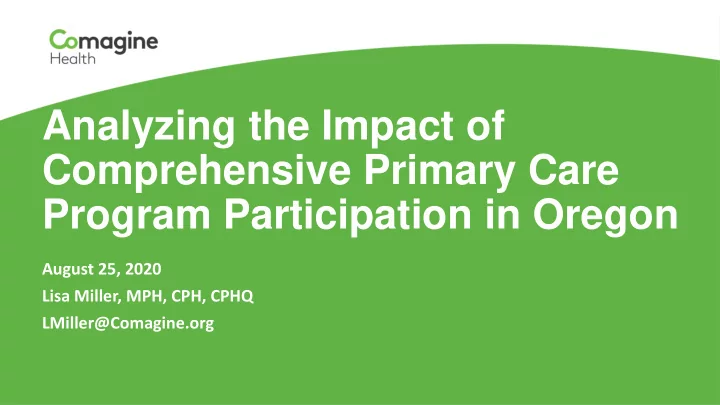

Analyzing the Impact of Comprehensive Primary Care Program Participation in Oregon August 25, 2020 Lisa Miller, MPH, CPH, CPHQ LMiller@Comagine.org
Comagine Health, formerly Oregon Health Care Quality Corporation, Qualis Health and Approximately 200 HealthInsight, is a national, nonprofit, health professional staff care consulting firm. • Data analysts • Health information technology specialists As a trusted, neutral party, we partner with • Medical directors and nurses health care organizations to address key • Case managers challenges. In all our engagements, we draw • Clinical reviewers upon our expertise in analytics, quality • Quality improvement experts improvement, care management, health information technology and research.
2019 claims data summary: Oregon Data Collaborative 80% 23% Fully Insured Self Insured Commercial Commercial population population 100% 87% Medicare FFS Medicaid and Medicare population Advantage population
Background • Comprehensive Primary Care Classic (CPC Classic) and Comprehensive Primary Care Plus (CPC+): CMS initiatives to strengthen primary care through care delivery transformation and multi-payer payment reform • Oregon has participated since CPC Classic began in 2012 • Comagine Health, along with Artemis Consulting and the Oregon Health Leadership Council convenes the 12 payer CPC+ Payer Group • In 2018, the Oregon CPC+ Payer Group committed to aggregating claims data with Comagine Health in order to help payers and practices learn from the CPC+ experience. CMS joined as a partner.
Analysis of the CPC+ Program in Oregon • Mathematica evaluation observed Medicare FFS population – didn’t address multi-payer needs • Analyses from The Health Collaborative in Ohio demonstrated how APCD data could be used to analyze the model, sparked interest in the Oregon Payer Group about using the Oregon Data Collaborative for similar analyses • “Data Bytes” approach allowed for targeted analyses that could be generated faster than a full-scale evaluation, responsive to payer and other stakeholder interest in the model’s progress
Methodology CPC participating group consisted of Oregon primary care practices that participated in both CPC Classic and CPC+ Comparison group consisted of Oregon primary care practices that participated in only one CPC program, or did not participate in either Measure results with fewer than 30 individuals in the denominator were suppressed Except for Comprehensive Diabetes Care quality measures, all data were from 2017 Medicare fee-for- service data is available through Comagine Health’s participation in the Medicare Qualified Entity program Complete results and methodology descriptions for both Data Bytes are available on the Oregon CPC+ Payer Group website.
Question 1: Is participation in CPC programs associated with any changes in the quality of care provided?
Results CPC-participating practices had higher performance rates than comparison practices across all payers on 24 out of 26 measures • Difference was statistically significant for 14 measures
Selected results by payer type * Indicates that the difference is statistically significant (p<0.05)
Question 2: Is participation in CPC programs associated with any changes in the utilization and cost of health care?
Results Participating practices had significantly more adult outpatient visits than comparison practices, across all payer types * Indicates that the difference is statistically significant (p<0.05)
Results Participating practices had lower adult emergency department (ED) utilization and fewer avoidable ED visits than comparison practices. Significance varied by payer. * Indicates that the difference is statistically significant (p<0.05)
Results Participation in both CPC programs was associated with lower risk-adjusted costs of care than the comparison group among commercially insured patients. This analysis reflects only claims-based facility costs; related professional services and alternative payment methodologies are not reflected. This analysis includes cost measures that are primarily claims-based, minimizing the impact of not including alternative payment methodologies.
Significance • CPC program participation is associated with improved quality, cost and utilization • Resulting analyses reflect care transformation at the population level using multi-payer aggregated claims data • These analyses demonstrate the value of aggregating multi-payer claims to drive care transformation and to drive future policy decisions throughout the health system • Assessing program impact can have significant policy implications and guide future decision-making
What’s next? The Oregon CPC+ Payer Group has requested five more Data Bytes by December 2021 • Primary care quality, 2015-18 • Primary care cost and utilization, 2015-18 • Behavioral health care quality, 2015-19 • Behavioral health care utilization and cost, 2015-19 • Care transitions, 2015-19
Recommend
More recommend